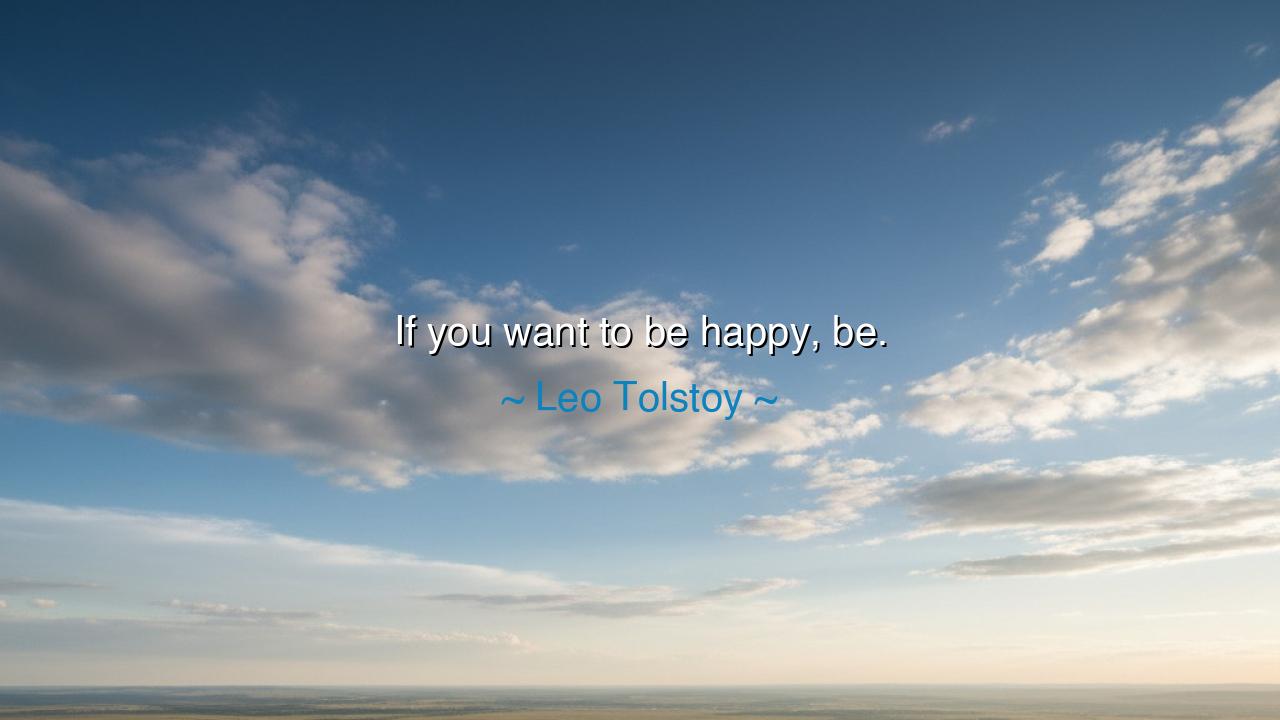
If you want to be happy, be.






“If you want to be happy, be.” So spoke Leo Tolstoy, the great sage of Russia, who wandered through the depths of the human spirit and returned with this simple, radiant truth. His words are like the calm of dawn after a long night—soft, yet filled with eternal strength. In them lies a wisdom as old as the earth itself: that happiness is not something to be chased, conquered, or bought, but something that already lives within us, waiting to be awakened. The command to “be” is not one of striving, but of stillness—an invitation to return to the heart, where peace has always dwelt.
In the restless world of men, this teaching is easily forgotten. We believe that happiness hides in distant lands, in wealth or praise, in the love of others, or in the victory of our ambitions. We run endlessly, grasping at shadows, believing the next possession, the next achievement, the next tomorrow will complete us. Yet Tolstoy, who knew the fullness of success and the emptiness that can follow it, reminds us that joy is not found by adding more to life, but by stripping away what is false. To be happy, one must simply be—to rest in the moment as it is, without demand, without fear, without the restless hunger that blinds the soul.
Tolstoy himself was no stranger to struggle. Born into nobility, he lived amid comfort and admiration, yet felt a great emptiness gnaw at his spirit. He had fame, family, and wealth, but none brought lasting peace. His heart was filled with questions—about God, about death, about meaning. And so, he withdrew from the illusions of power and turned inward. There, in the quiet fields of his estate, he discovered what he had long missed: that happiness is not a gift bestowed by fortune, but the natural state of a heart aligned with truth. He found joy in simplicity—in work, in kindness, in being present to life itself. It was then that he uttered his immortal words, born not from theory but from revelation.
To be happy, then, is not to wait for the perfect day or the perfect self. It is to accept the present moment in its fullness—to see beauty in the ordinary, to find peace even amid uncertainty. The great Stoic philosophers of old understood this as well. Marcus Aurelius, emperor of Rome, wrote in his meditations that “very little is needed to make a happy life; it is all within yourself, in your way of thinking.” Like Tolstoy, he had tasted both power and solitude, and learned that peace is born not of circumstance, but of perception. Happiness, he and Tolstoy would agree, is not an achievement—it is a decision.
But to “be” requires courage. For to be is to face oneself without disguise, to stand still in a world that urges constant motion. It is easier to fill the silence than to listen to it, easier to chase than to rest. Yet only when we stop running do we discover that what we sought has been with us all along. The river need not search for the sea—it is already flowing toward it. So too the soul need not search for happiness—it must simply remember its own nature.
Consider the story of Siddhartha, the young prince who left his palace to seek the truth of life. He wandered through forests, fasted among ascetics, and sought wisdom from every teacher. Yet, in the end, beneath the Bodhi tree, he found enlightenment not through struggle, but through being—through stillness and acceptance. He saw that all his searching had been but a circle returning to the center. In that moment of pure presence, he became awake—and peace, vast and wordless, filled him.
So, my children, if you would be happy, do not chase after it as though it were a bird that must be caught. Sit quietly and be. Let go of the past that chains you, and the future that haunts you. Look upon the world with eyes unclouded by desire. Feel the breath in your lungs, the ground beneath your feet, the pulse of life moving through you. That is the essence of being—and in that being, happiness is born, effortlessly and eternally.
Therefore, learn from Tolstoy: to live simply, to love deeply, to stand still and know that you already have what you seek. The secret is not to do more, but to be more—to be present, to be grateful, to be alive. For the truth is this: happiness does not come to those who search for it, but to those who stop searching and begin to be.






AAdministratorAdministrator
Welcome, honored guests. Please leave a comment, we will respond soon